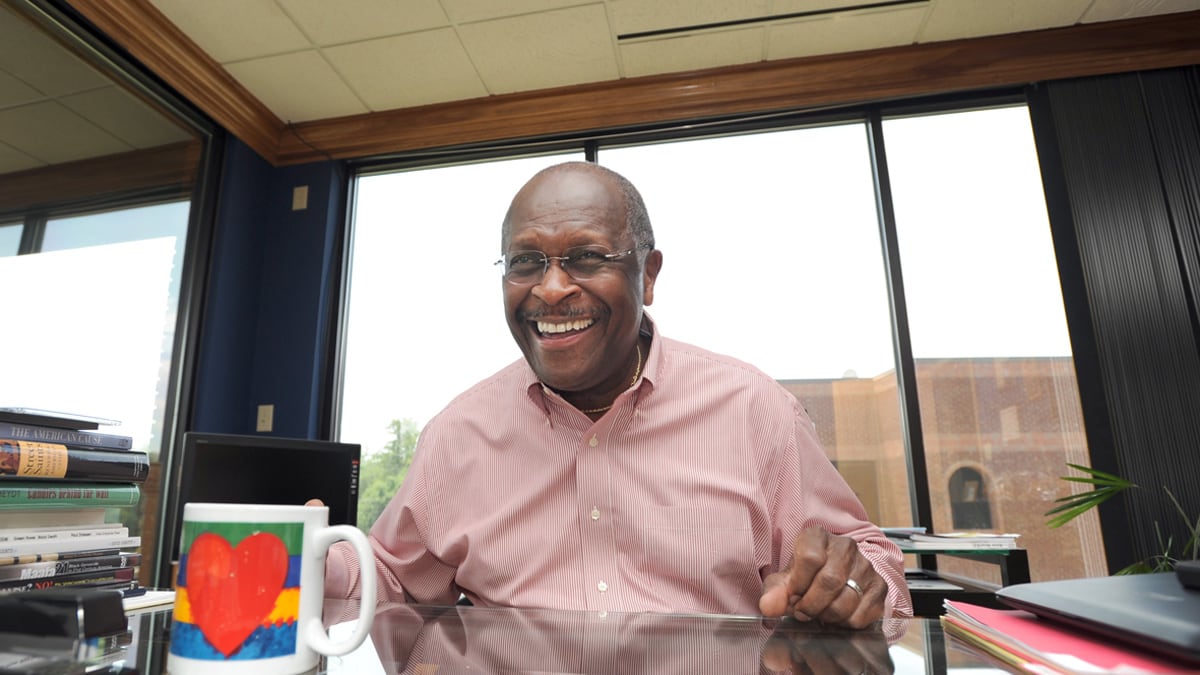The demise of an unsuccessful campaign can have a devastating impact on political veterans. “I came home, got under the bed, got in a fetal position, and sucked my thumb,” says David “Mudcat” Saunders, who was senior strategist for John Edwards’s 2008 presidential race. “That’s what most candidates do. It took me about six months to fully recover. As Leo Durocher said, ‘You show me a good loser, and I’ll show you a loser.’”

Herman Cain ended his run for the GOP nomination in December, but if he’s now supposed to be licking his wounds in a darkened bedroom, somebody forgot to tell him.
Most candidates withdraw from a race and find their entourage has evaporated and they’re wrestling with their own wheelie bags in the airport. “It ain’t pretty,” says Ed Rollins, the longtime Republican strategist who advised Michele Bachmann last year. “You go off to pick up the pieces, and everyone’s gone.”
But these days, Cain is juggling media requests, hiring new staff, planning a grandiose national initiative to promote his 9-9-9 tax-reform proposal, and grinning his way from one engagement to the next with the gleeful relish of a fox surveying a packed henhouse. “I’m having a ball, because I can still be a thorn in the side of the establishment and those that are threatened by my success,” he says, flashing a dazzling smile. “I’m doing what the people want done. This new phase is going great.”
Some experienced political hands are bemused by Cain’s seemingly bulletproof good cheer. “The music has stopped, and he’s just dancing away,” observes Paul Begala, the former Clinton strategist and Democratic consultant (who is also a contributor to Newsweek and The Daily Beast). Instantly identifiable in his trademark fedora and yellow tie, Cain makes his way through public spaces at the stop-and-start pace of a celebrity beset by fans. As staffers try in vain to hurry him on to his next appointment, admirers grab his hands, ask to take pictures, and gush about their admiration. In the last week alone, Cain has been interviewed by everyone from Piers Morgan and Wolf Blitzer to Sean Hannity and Bob Schieffer. Barbara Walters chased him down a hallway to beg him to reveal his endorsement for the GOP nomination on The View, according to a Cain media aide whose smartphone now flashes a photo of Walters cuddling up to the former candidate.
Many ex-contenders find it hard to stop second-guessing their performance. “I was mad at myself because I made a lot of stupid mistakes during the race,” says former Vermont governor Howard Dean of his 2004 presidential run. “There were definitely things I would have done differently.”
But Cain insists he has no regrets. Although he admits that his campaign was “exciting,” and that terminating it was “bittersweet,” he claims to be “100 percent at peace with the outcome.”
“You make a decision and you go forward,” he says. “We never look back and say, ‘Wish we could have ...’ ”
Cain attributes his high spirits to Cain’s Solutions Revolution, the new initiative he is planning to launch in South Carolina before the state’s Jan. 21 primary. “Politics wasn’t my life, and the reason I didn’t hit that emotional rock bottom is that I immediately started to think about Plan B, and I started to get exhilarated about it,” he explains. “I was like David going up against Goliath, and Plan B is to create an army of Davids. The goal is for 9-9-9 to become the law of the land.”
In addition to tax reform, Cain is developing an agenda of regulatory reform, energy independence, and monetary reform he plans to promote in bus tours, rallies and town-hall meetings around the country—all part of what he describes as a mission to “transfer power from the government to the people.”
Some political veterans doubt that eager throngs will flock to hear his words of wisdom. “He’s not done in his head yet; he thinks, ‘I’m still going to have big crowds,’” Rollins observes. “In about a week, he’s going to see that there are no crowds. After you’re out, you become totally irrelevant in the political process. They don’t care.”
So far, however, Cain is savoring the advantages of ending his campaign. “The decision to drop out was difficult, in that my supporters and I had invested so much in getting to that point,” he says. “The sweet part is that I’m now back in control of my life, rather than the campaign and the media class being in control of my life. I’m back to a sense of liberation about what I can say and how I say it.”
Cain—whose favorite saying is “Let Herman Be Herman”—blames the end of his run on “the constant negative spin because I had become a threat to the establishment. As long as I was just an unconventional candidate no one took seriously, they didn’t care, but all of a sudden this unknown businessman starts to rise to the top of the polls, and I believe the left and the political class became threatened.”
In suspending his campaign, Cain cited the adverse impact on his family of charges that he committed sexual misconduct in the workplace and had a 13-year affair with Ginger White. Although he denied any sexual impropriety, he admitted giving money to White without the knowledge of his wife. Cain says she has since recovered from the upsetting effect of those scandals. “Today she feels fine,” he says. “We know what the truth is.”
True or not, Cain believes such issues shouldn’t play a significant role in assessing a candidate’s fitness for office. “I think that focusing so much on someone’s personal, sexual, or marital affairs is a distraction,” he says. “It’s a matter of degree; if it’s above a certain point, yes. If you have someone who has lived a polygamous life, that would raise questions about their character and ability to obey the law. But the fact that somebody had been divorced and remarried—so what? Infidelity? If people want to put that into their evaluation, they have the right to do so. But the first thing I want to assess is your ability to lead and solve problems.”
The former Godfather’s Pizza CEO admits that his unexpected rise in the polls was so “surreal” that it gave him an “Alice-in-Wonderland feeling” that prompted him to pray for divine guidance. His lack of political experience led many to view his campaign as fundamentally unserious, but Cain denies he had ulterior motives for seeking a higher profile.
“I was accused of not running to win, of doing it to promote a book. That’s a lie,” he says. “I’d already published four successful books, and revenue was not an issue for me before I decided to run for president. My expectation was to give the American people an alternative to just another politician, and I felt I had just as good a shot of winning as anybody else.”
These days most interviewers want to know which Republican rival Cain will endorse, but he isn’t enthusiastic about any of them. “You listen to the candidates remaining, and when they get through talking, you don’t know what they said. They go to a secret school to learn how to do that,” he says mischievously. “I didn’t go to that class. I played hooky from politicalspeak.”
Although Cain has promised to announce his decision in South Carolina, his caginess about the nature of his endorsement suggests that he might not name anyone. “A conventional endorsement is you offer your support to another candidate,” he says. “I question their value, and if I endorse one of the primary candidates, it could fragment my supporters. They are broken-hearted that I am not in the race, but I want them to focus on bold solutions, and on defeating Barack Obama. I’m going to be making an unconventional endorsement. I want it to be part of a bigger message. Most people in the media will not like it, but the American people will love it, and it will have a bigger impact on the direction of the Republican Party, which is one of my main concerns.
Cain is equally unenthused about the current state of the GOP. “Too many Republicans and conservatives are looking for the perfect candidate, and he or she does not exist,” he says. “The party now is too scattered, too generic. Solid solutions—that’s the direction it should go in. That’s why I was so successful.”
At present, he doesn’t intend to run again. “I plan to have nine more working years in my career; by then I’ll be 75,” he says. “To spend half of those years contemplating another run, I’d be giving up half of my life to go through that sausage grinder again, and ‘stupid’ isn’t on my forehead. I’ve always practiced ‘decade goals,’ and my decade goal now is to make 9-9-9 the law of the land.”
In formulating that plan, Cain is following the playbook established by some of his predecessors for dealing with defeat. “You can either wallow in the frustration or go and do something constructive and important,” says Robert Shrum, senior advisor to Al Gore’s 2000 campaign and John Kerry’s 2004 race. “Gore went off for a while to get his head together about all this, and then he came back with a roar on the issue of climate change and made an almost unique transition from being a political figure to a prophet. Whether you agree with him or disagree with him, he’s had a worldwide impact on one of the biggest issues of our time.”
For longtime public servants like Gore, losing the big race is a painful way to end a political career. But for a growing number of wildcard outsider candidates, both the costs and the benefits are different. A well-orchestrated flirtation with a presidential race can boost someone’s reality-show ratings—just ask Donald Trump—or speaking fees and book advances, as Sarah Palin might attest.
Cain would doubtless welcome being anointed as a prophet. Failing that, a bestseller, some whopping speaking fees, another radio show, or a juicy television contract might be the perfect consolation prize. But since nothing lasts forever, he would do well to manage his expectations, according to former Massachusetts governor Michael Dukakis, who lost the 1988 presidential race to George H.W. Bush.
“Make sure you’re ready for reentry,” says Dukakis. “Always anticipate the return to your previous life.”






